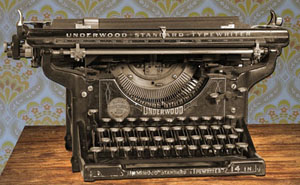
They don’t print novels this way any more….
I finished my last article, Mainstream or Indi – which way would you go, with a couple of questions:
Question one asked whether you thought it true that mainstream published authors received 30% royalties.
Well sadly the answer is no, it isn’t true. The Writers & Artists’ Yearbook quote 10% for hardback, 7.5% for paperbacks. As an indie author you will get a larger proportion of your book’s sale price, but unlike mainstream authors, you will need to fund such things as editing services, jacket design etc.
In that same Writers & Artists Yearbook article you will also find information about advances. In my experience, the advance is drip-fed. When Random House published me they offered what I thought was a fairly exciting advance (by late 1990s standards!) but this was spread over two books with part paid on signature, a little more on the publication of the hardback of A Rational Man, a little more for the paperback; then two more drizzles for the hardback and the paperback of The Arrogance of Women.

The Arrogance of Women – my second novel
As an hourly rate it wasn’t anything like as punchy as it had felt when they first wafted the contract under my eager and rather naïve nose.
According to The Society of Authors ‘The median annual income of a professional author is £10,500, which is well below the minimum wage.’ A pretty depressing statistic, and the reason many authors take up other activities. Like teaching.
I was given lots of good advice about not going into teaching, that doing so would sap my creative juices. Did I listen? Did I hell. That’s one of the reasons it’s taken me so long to get back in the writing game.
Of course, it’s not all about money. When you go to a mainstream publisher your work gets the attention of an editor, both line editing (details of the text) and developmental i.e. looking at your story’s pacing, the story arc; then there’s copy editing, ensuring that your work accords with the ‘house style’. If you self-publish, you would be well advised to hire an editor to do this for you.
Preparing for Publication
So, you’ve written your novel, polished it as much as you can. What next? I would say that a good idea is to get someone to read it and to give you feedback.
Beta Readers
Maybe you’ve given your novel to a friend or family member to read, and they’ve told you it’s great. That’s lovely to hear, but be careful of taking their word for it. They love you and they don’t want to hurt your feelings…
I did share my work with a friend, many years ago, but I was lucky. We were both writing and both wanted nitty gritty feedback on our work. I cannot tell you how nerve-wracking that was. I remember the first day, sitting either side of her kitchen table, each reading the other’s work – and the unnerving slide of her pencil as she made notes….urgh!
But it was worth it. Just knowing someone else was going to read my work made me far more self-critical.
Eventually I reached the point where I knew which parts she was going to pick me up on – though I confess I sometimes typed faster in the hope that she would then read faster and that I’d get away with it, and not have to kill that particular darling…
So the question is, how do you go about getting that level of feedback? These days, the first step seems to be to get yourself a ‘beta reader’. Let me be up front, I have not done this, but know I will need to in the not too distant future. Beta readers are not editors, they are simply your first readers and they will tell you what they think about your book, did they enjoy it, did the characters engage them…
The Writers & Artists website has a brief article on beta readers and The Literary Consultancy have some more detailed advice.
Editing
A first pass at editing is something we can all do for ourselves…but if you are going to go to the effort and expense of publishing your work, you want it to look as professional as possible. In my view there is nothing worse than a book where the production values (whether that be how well the work has been edited, or the cover design) screams self-published. A self-published book should look every bit as good as (and be indistinguishable from) a mainstream published book.
To that end, it really is best to outsource this. I use all sorts of tricks to edit my work – even taking it to a different room to read can give me a ‘fresh eye’ but in the end, I can’t fool myself, I know what I’ve written and so I read what I’ve written, even if it’s not actually on the page.
So get a professional in! Ellie Stevenson who ran the Cultivator day I attended recently, recommended The Society for Editors and Proofreaders for finding a reputable editor. The Alliance of Independent Authors also offer a Services Directory
Types of Editing
Structural editing
This is also known as ‘developmental editing’ and is to do with the shape of your whole work. For example:
- Would you novel work better written in the first person present tense instead of third person past tense?
- Is that character really necessary? I know you’ve worked on it for an age, but truly? I still have a character from my first novel, A Rational Man who had no real function. The character’s name was Hazel and she was the male protagonist’s sister. I was very fond of Hazel but she just had to go. Gone, but not lost: one of these days I’ll find her a role…
- Story arc: do your characters undergo a worthwhile change? Is that change convincing? In The Arrogance of Women, Eleanor cannot change and that is her tragedy, but Adam can and that is his triumph. In other words, Adam’s story arc ascends as Eleanor’s falls
Line editing
This is exactly what it appears to be i.e. the editing of a work line by line. Does that sentence work? Does it flow? Try reading it aloud, do you stumble? If you are willing to read a substantial extract of your book out loud, if you can possibly bear to do so (I found this hard in the beginning but trust me, the benefits outweigh the trauma 🙂 ) record yourself. What I found was that as I read, I entered the world of the novel and began to ‘perform’ the words on the page and in doing so, I (unconsciously) edited as I went along. Listening back with my script in front of me, I was able to see where I’d made changes and decide whether they were valid. Sometimes they weren’t, but often they were. This technique also helped me crack the art of dialogue.
Copy editing
Again this is line by line, and is about the nitty gritty of spelling and grammar. If you were writing a magazine article, or if you are mainstream published, this will also involve adopting the ‘house style’.
Those Tricky Questions…
At the end of my last blog, I asked two questions.
The first of these was about income, the percentages authors can expect to receive for their work. I hope you find this has been answered, but to summarise: in mainstream publishing the returns may be smaller but a lot of the hard graft is done for you. As an indie you need to commit both money and effort but if you are successful the rewards are greater, and you have a lot more control over your workand how it is presented.
In my view, the answer to the question about stigma is both yes and no. Certainly the stigma is less than it used to be in the days of old-fashioned ‘vanity publishing’ but there are still issues of quality and a need for gatekeepers.
Nowadays anyone can publish their life’s work which at one level is wonderfully democratising. However, with my reader’s hat on, what kind of vetting can I trust when it comes to those self-published works? How do I choose what to read?
Routes to Publication
A word of caution. There are any number of people out there willing to take your money to publish your work. Some of them are honourable and some less so. So how do you choose?
There are many ‘publishing houses’ who will empty your purse and publish your work regardless of whether it’s any good. Now that may sound harsh, but the hard truth is that not everyone who wants to write can write. Trust me, I taught creative writing in Cambridge for many years and know that the desire to write is not equivalent to the ability to write. Mind you, the ability to write and write well is no guarantee of success.
By way of a personal note, my agent once reported back a conversation he’d had with someone in (I think) the publisher’s marketing department, along the lines of, ‘The trouble with Teresa is that all she is, is a very good writer…’
All she is? I remember thinking, what more do they want?
Well they wanted me to have had an affair with someone famous, or to have robbed a bank, or goodness knows what. Something more than the writing to get me noticed.
How sad is that?
Mainstream publishing was hard to break into even back then. Now it is even harder. But there are alternatives.
So, what are the options?
-
- You stick to your guns and keep hammering at those mainstream doors
- You decide to do it all yourself using tools such as Calibre, Scrivener, KDP (more of these in a later blog)
- You find a publisher willing to put your work out there for a fee
- You go to a hybrid publisher who may well charge you more, but who has built a reputation for publishing quality work. These publishers WILL turn down work that is not up to standard. They are your first gatekeeper.
We will look at some of these options in a later blog but in the meantime, which way would you go? Or if you have made your choice, do you have any advice to offer? I would love to hear from you….
Comments either on Twitter or in the box below please
IMPORTANT NOTE: in this and other blog posts I may direct you to external sites which I think offer further information. I do this purely for information and am NOT recommending that you use any services offered by these sites!







1poultry
2fulfill